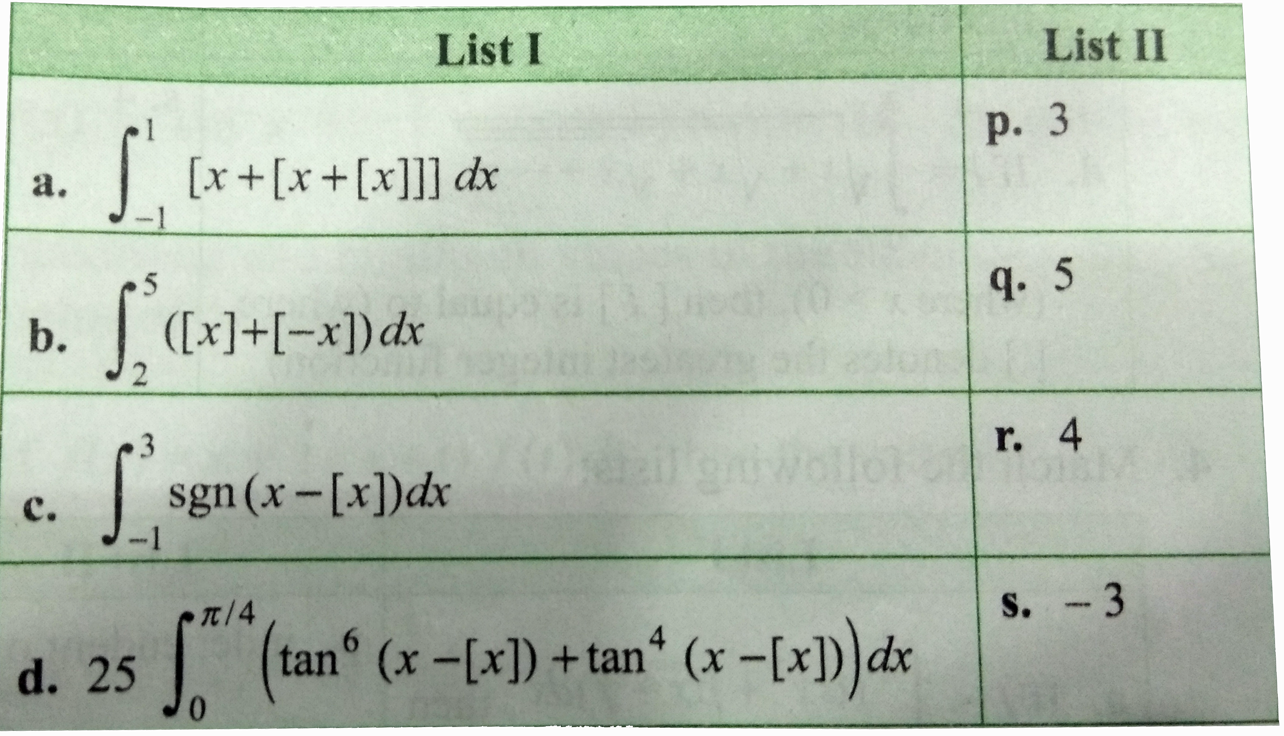Consider the polynomial f(x)=ax2+bx+c. If f(0)=0,f(2)=2, then the minimum value of ∫20∣∣f′(x)∣∣dxis__Solution in Bengali
The correct Answer is:2
∫20|f'(x)|dx≥∣∣∣∫20f'(x)dx∣∣∣
or ∫20|f'(x)|dx≥|f(2)|=2
Topper's Solved these Questions
- BOOK - CENGAGE PUBLICATIONCHAPTER - DEFINITE INTEGRATION EXERCISE - JEE MAIN12videos
DEFINITE INTEGRATION
- BOOK - CENGAGE PUBLICATIONCHAPTER - DEFINITE INTEGRATION EXERCISE - JEE ADVANCED38videos
DEFINITE INTEGRATION
- BOOK - CENGAGE PUBLICATIONCHAPTER - DEFINITE INTEGRATION EXERCISE - MATRIX MATCH_TYPE6videos
DEFINITE INTEGRATION
- BOOK - CENGAGE PUBLICATIONCHAPTER - CURVE TRACINGEXERCISE - EXERCISES24videos
CURVE TRACING
- BOOK - CENGAGE PUBLICATIONCHAPTER - DETERMINANTEXERCISE - Multiple Correct Answer5videos
DETERMINANT
Similar Questions
∫π0[cotx]dx, where [.] denotes the greatest integer function, is equal to
01:51View SolutionLet f be a non-negative function defined on the interval [0,1]. If ∫x0√1−(f′(t))2dt=∫x0f(t)dt,0≤x≤1,and f(0)=0, then
06:07View SolutionIf [.] denotes the greatest integer function, then match the following lists:
 05:27View Solution
05:27View SolutionFind the derivative of y=sin2x−cosx
01:30View SolutionIf x∈R,ai,bi,ci∈R for i=1,2,3 and ∣∣ ∣∣a1+b1xa1x+b1c1a2+b2xa2x+b2c2a3+b3xa3x+b3c3∣∣ ∣∣=0, then which of the following may be true ?
06:21View SolutionConsider the polynomial f(x)=ax2+bx+⋅ If f(0),f(2)=2, then the minimum value of ∫20∣f′(x)dxis__
02:12View SolutionSuppose ∣∣∣f'(x)f(x)f''(x)f'(x)∣∣∣=0 is continuously differentiable function with f′(x)≠0 and satisfies f(0)=1 and f'(0)=2 then (lim)x→0f(x)−1x is 1/2 b. 1 c. 2 d. 0
02:57View SolutionTo illustrate the Mean Value Theorem with a specific function, let’s considerf(x)=x3–x,a=0,b=2. since f is a polynomial, it is continuous and differentiable for x, so it is certainly continuous on [0, 2] and differentiable on (0, 2) such that f(2)–f(0)=f'(c)(2–0)
06:01View SolutionConsider the polynomial f(x)=ax2+bx+⋅ If f(0)=0,f(2)=2, then the minimum value of ∫20∣∣f′(x)∣∣dxis__
03:43View SolutionSuppose ∣∣∣f'(x)f(x)f''(x)f'(x)∣∣∣=0 is continuously differentiable function with f′(x)≠0 and satisfies f(0)=1 and f'(0)=2 then (lim)x→0f(x)−1x is 1/2 b. 1 c. 2 d. 0
04:27View SolutionConsider the polynomial f(x)=ax2+bx+⋅ If f(0),f(2)=2, then the minimum value of ∫20∣f′(x)dxis__
09:31View SolutionIf f(x)=(1+x)2, then the value of f(x0)+f′(0) +f02!+f03!+fn(0)n!.
05:51View SolutionIf f(x)=(1+x)2, then the value of f(x0)+f′(0) +f02!+f03!+fn(0)n!.
01:35View Solutionf(0)=1,f(2)=e2,f'(x)=f'(2−x) , then find the value of ∫20f(x)dx
03:20View SolutionLet f(x)={sinx2xx≠0<br>0x=0, then f′(0+)+f′(0−) has the value equal to (a) 0 (b) 1 (c) 2 (d) None of these
08:05View SolutionThe function kf(x)=ax3+bx2+cx+d has three positive roots. If the sum of the roots of f(x) is 4, the larget possible inegal values of c/a is ____________.
04:09View Solution

